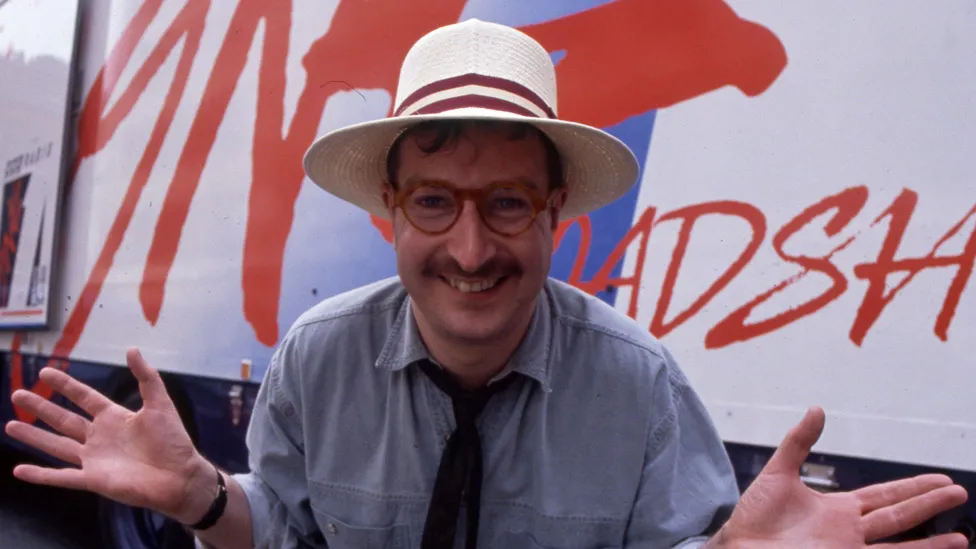A cheerful, constant companion for millions of loyal listeners over more than 40 years, Steve Wright was one of the most popular personalities on Radio 1 before transferring that success to Radio 2.
Whether leading his high-energy posse on Radio 1 in the 1980s, hosting his Big Show on Radio 2 or playing some Sunday Love Songs, Wright was a giant of British radio. Listeners knew they could rely on him for a reassuringly friendly voice and feel-good company.
He was also a true radio pioneer. Putting a British spin on the American “zoo” format, he assembled a squad of upbeat sidekicks and whacky characters (who remembers the apoplectic Mr Angry and the rambling Sid the Manager?), and made sure every listener felt like part of his club.
Then there were regular features like his factoids and serious jockin' (no G) plus fixtures like celebrity interviews and non-stop oldies, as well as the innovative sound effects and jingles that made sure his shows never sounded dull.
Born in south London, Wright started out working in the BBC record library before joining local radio, co-hosting a show called Read and Wright with fellow future Radio 1 DJ Mike Read. Like many other broadcasters, Wright was given a break by commercial station Radio Luxembourg before being recruited by Radio 1 in 1980 as one of a wave of fresh new DJs.
Initially put in a Saturday slot, the following year he graduated to the weekday afternoon show, which he would make his own until 1993. During a turbulent time for the station as many of the older DJs were controversially axed, he was moved to the breakfast show from 1994 but resigned the following year, citing the “challenge” of the flagship slot.
After a brief spell on commercial station Talk Radio, he joined Radio 2 in 1996, when that station was trying to attract a new audience.
While he preserved his trademark energetic style, he did tone it down a little for the older listeners. When Radio 2 controller Jim Moir recruited him, he jokingly told him: “Whatever you do, Wrighty, don't frighten the horses.”

Wright was initially on Radio 2 on Saturday mornings before resurrecting Steve Wright in the Afternoon on the station in 1999.
“It was three hours of relentless energy,” fellow Radio 2 host Jeremy Vine said in a tribute on Tuesday.
“He would come in at 09.00 or 10.00 in the morning every single day, five days a week, and all of us, maybe just a bit younger than him, would just watch in wonder at what he did.”
American radio research
Wright put a huge amount of work into crafting the elements of his show. “It was driven by this obsession that he had, this passion for radio,” Vine said.
“When I tried to find out – because I'm a massive fan of his – what exactly was behind it, he would say that in every spare moment, he would fly to America and drive around America listening to different American radio stations to get ideas.”
In 2006, BBC 6 Music DJ Tom Robinson recalled asking Wright for advice, and noted down his “nine commandments” for a successful show. They included to “keep the energy up” and vary it in each section; think ahead so you know what you'll do next; and “have pegs in your programme – things you always do – and always do them”
Another former colleague, Nicky Campbell, called Wright “a complete and utter radio genius” following the news of his death.
“He was such an inspiration that you could be creative, you could be irreverent, you could try and be funny,” Campbell said.
“To see him operating… the speed of thought, his brain was like quicksilver. There was never a dull moment with Steve.” Off air, Wright was famously quiet about his private life, to the extent that he was described as an enigma. He married Cyndi Robinson in 1985 and they had two children, but the couple divorced in 1999.
He also fronted numerous shows on TV including Top of the Pops and The Steve Wright People Show. But radio was his natural home. When he was made an MBE in the latest New Year Honours, he dedicated it “to all the people in broadcasting who gave comfort and public service during the pandemic”.
He hosted the sentimental Sunday Love Songs on Radio 2 for 25 years, and took over as presenter of the long-running Pick of the Pops late last year.
That came after his departure from the afternoon slot after 23 years. He said the station's controller had told him she wanted to do “something different” with his mid-afternoon slot, but he appeared to bear no hard feelings.
On his final Radio 2 afternoon show in 2022, he summed up his formula.
“I've tried on this programme to bring just a little bit of light relief, a good genuine atmosphere, uplifting tunes, good conversation, a little bit of satire,” he said.
“I've tried to make the show unique and just be good company. I can only hope that we've done that some of the time.”
— CutC by bbc.com


